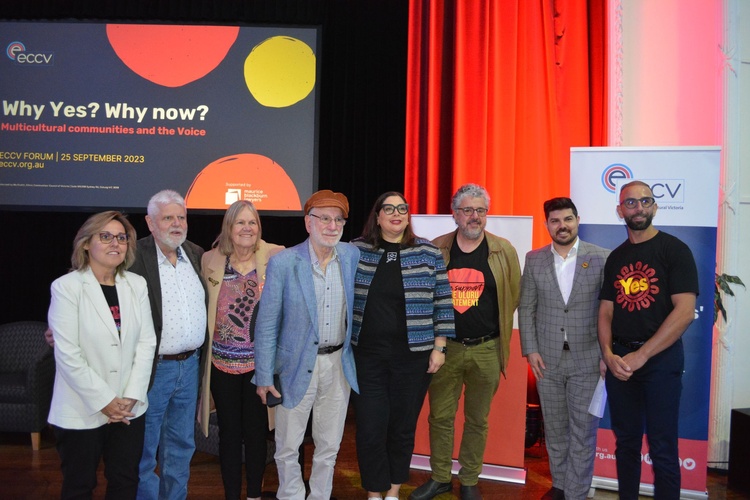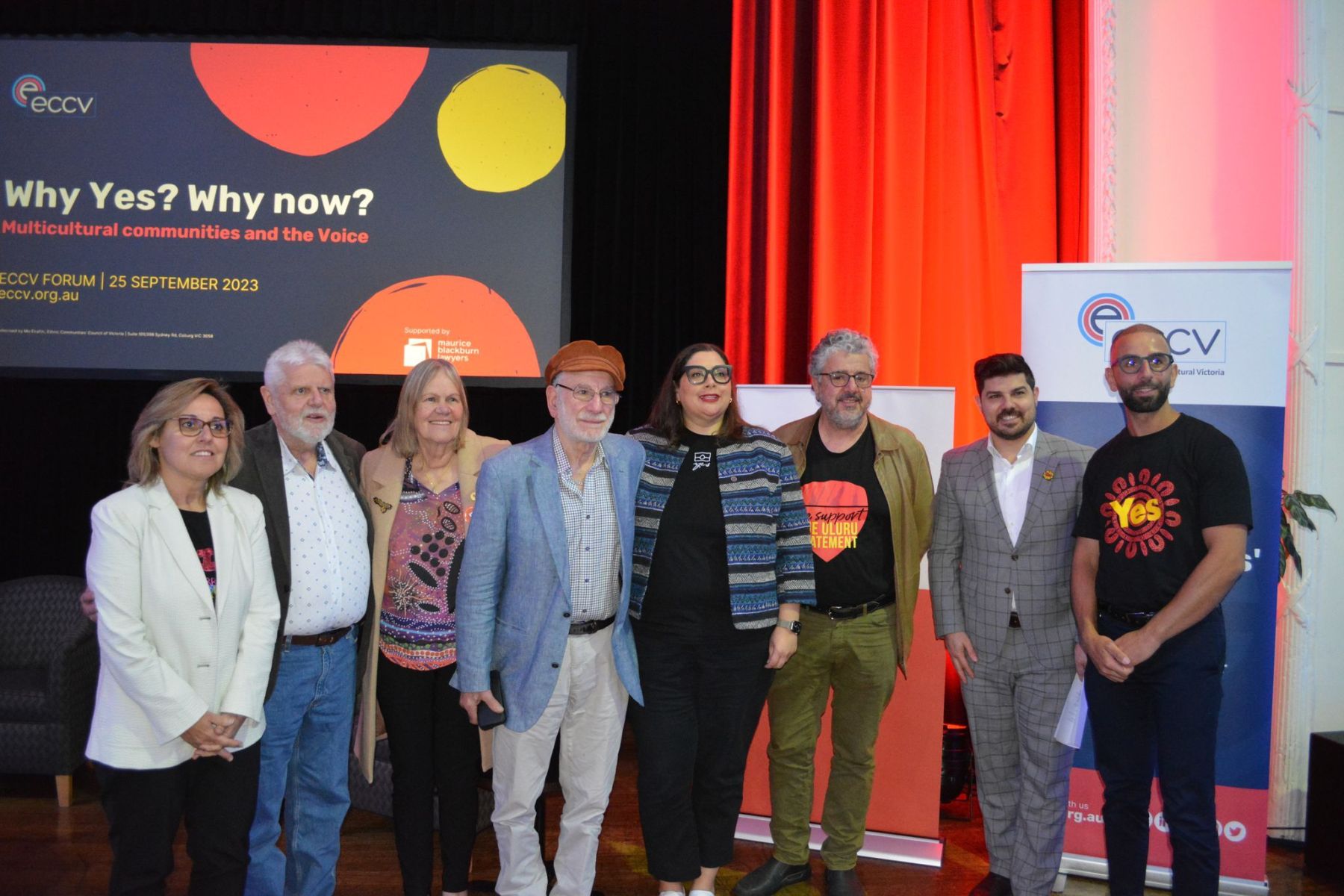For Anthony Cianflone MP, State Member for Pascoe Vale, this period has been one of listening “to the community and to First People themselves.”
Mr Cianflone has spent time considering the issues. He is all too familiar with the marginalisation that occurs when a community group is ostracised from the mainstream. His family came to Australia from Calabria in the post war migration period, responding to calls put out by then Labor Prime Minister Ben Chifley and Immigration Minister Arthur Calwell to populate the nation. He describes the difficulties that they and other migrants have had in establishing their voice.
His experiences, whilst different in many ways to that of First People, gives him insights into the challenges that continue for First People. He is clear in his thinking, the upcoming referendum is based around social justice:
“In doing so the post World War II generation of Italian and largely southern European migrants also helped Australia to begin dismantling the then ‘White Australia Policy’. Migrant by migrant, brick by brick, the Italian migrant community played a driving role in helping Australia to become the most successful, vibrant and prosperous multicultural nation on Earth in answering the “populate or perish” call of their era.”
Mr Cianflone joined one of the peak bodies for migrant communities, the Ethnic Communities Council of Victoria, and Maurice Blackburn Lawyers to bring constituents together in his electorate at Coburg Town Hall on the 25th September. The objective was to hear from leading representatives of First People and migrant communities to understand the implications of the referendum:
I truly believe that today’s generation of culturally and linguistically diverse communities - whether of first generation, second generation or third generation descent – have a responsibility to now stand with and support the calls of First Nations communities in their struggle for recognition.
Amongst the speakers, member of Victoria’s First People’s Assembly Aunty Esme Bamblett spoke of her hopes that migrants can draw on their understandings of the importance of community connection when they consider their responses to the upcoming referendum.
Aunty Esmee spoke to Il Globo of growing up in Shepparton, with a cheeky smile as she recalled her fond childhood memories of playing and being surrounded by Italian friends. She spoke of her admiration for the hard work of the migrants despite them being ostracised from the mainstream community at the time.
Aunty Esme is a Bangerang, Taungurung and Wiradjuri woman has young great grandchildren and hopes that they might grow up in a country in which they have constitutional recognition, like its other citizens.
Another distinguished speaker, Professor Mark Rose, is familiar with the “detrimental impact of successive government policies”, both on a personal and professional level. Currently, he is the Pro Vice Chancellor, Indigenous Strategy and Innovation at Deakin University. His hope is that Australians will vote ‘yes’ to establishing an advisory group for First People which is enshrined in the Constitution. He feels such an Advisory body would ensure that Governments are provided with the advice needed to guide initiatives and policy making, “this means funds are spent wisely and effectively to support educational and health outcomes. Governments need to listen rather to do what they think works without consultation. This only continues the pattern of getting it wrong.”
The nephew of famous Aboriginal boxer Lionel Rose, Mark’s own life work has been to ensure that education is available to all children, despite their cultural identity. Mark’s grandfather, a Gunditjmara man, was stolen from his family as a child and never seen again. This set off a terrible chain of events that have cast a shadow over Mark’s own life. Despite the difficulties, Rose looks forward to a future in which First People are recognised in the Constitution.
The No campaign has focussed on challenging the need for a further advisory body. However, Eddie Micallef, Chair of the ECCV drew on his own experience of many years in Parliament to point out the “pattern by successive governments in establishing, then scrapping Aboriginal advisory bodies and important initiatives so that there has been little real impact on bettering services and equity outcomes.”
With over 150 registrations for the event held at the iconic Coburg Town Hall, the participants listened to an impressive panel moderated by Maria Dimopoulos AM. Participants represented a range of political views, ages, vocational roles and cultural backgrounds. Coburg has always been a gathering place for migrants over the decades, and central to the migrant experience for Victorian Italians.
Gino Iannazzo and Vic Guarino from the Australian Pensioners Voice Association remember the days of their youth when they landed at Station Pier, each with one suitcase. They have been part of connecting the Italian community to services and opportunities for decades. They were there to support the Voice as part of their contribution to their adopted country. Others were not sure, so they listened to understand. What united the gathering was a sense of the importance of the upcoming Referendum.
With First People representing just over 3% of the population, it is clear that 97% of non-Aboriginal and Torres Strait Islander peoples will be the decision makers.
Whilst many No campaigners feel that it should be only First People to decide, the Yes campaign points to the decisions made at the historic gathering at Uluru of many Aboriginal nations. There the gathering discussed and consented on the need for a constitutionally enshrined voice to parliament. The Yes campaign remind the community that the Statement was formed after decades of research, discussion, and work by First People themselves.
Mr Cianflone stated that “the calls of today’s First Nations community is very clear, modest and respectful as set out in the Uluru Statement from the Heart”.
The CEO of ECCV, Mo Elrafihi referred to the Referendum as the opportunity for nation building. Constitutional lawyer, Shireen Morris was clear that the advisory body, would provide advice. It would be up to the government of the time on how it would attend to the advice.
Carlo Carli, CEO of the Federation of Ethnic Communities Council of Australia (a peak body representing multicultural voices to government) urged participants to drawn on reputable sources of information to learn and engage with these important questions which will be asked through the referendum.
The Hon. Dr Anne Aly MP also attended the meeting and spoke from a personal perspective. She shared the cultural diversity within her own family: Egyptian, Burmese, Canadian, Bosnian, Somalian, Mauritian amongst others. She explained her family was looking forward to celebrating a wedding in which her niece will marry an Aboriginal man. She explained that
this richness is the dream of multicultural Australia, however, while I am full of hope for our family, I am also scared. Scared, for the First Nations children in the family. They will have fewer opportunities than the other children – unless things change.
Sheena Watt MP is the first Aboriginal Australian woman to serve as a Labor Member of Victoria’s Legislative Council. Before taking up a role in politics, she worked for Aboriginal health organisations and has seen the “inadequacy of services.” At the Coburg Town Hall event, she spoke of the importance of the historic moment of forming the Uluru Statement of the Heart.
Minister Watt explained that “voting YES in the Referendum will be a lasting legacy for the Italian community. It's not just for today but for generations to come. Changing the constitution is about rewriting Australia's story, and your family's story.”
“Your descendants will ask, 'Did we stand up for justice and equality in the Referendum?












